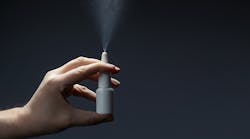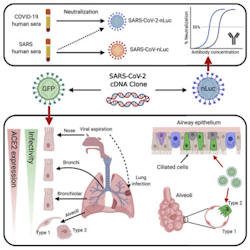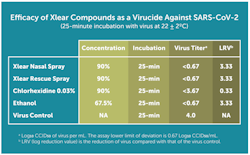Of all the things we do to protect staff and patients in dentistry, there’s one inexpensive process that can reduce the viral load of the aerosols generated in our day-to-day practice. Anyone can also use this information about xylitol and microbes to protect themselves against SARS-CoV-2 and other diseases.
breathing. Improper breathing with the mouth open is likely the biggest culprit. Inhalation vacuums in the viral bits from the air and they take root in the oropharynx. The higher the concentration of viral bits, the worse the infection. Figure 1 describes the sequelae.1
Many practices ask patients to use a preprocedural rinse at the office, and there are several available. In dentistry we’ve come to know xylitol as a caries inhibitor, and we’ve often asked our patients to use a xylitol-containing gum multiple times a day to reduce early biofilm colonizers. We almost never think of the nasopharynx or oropharynx as a seeding or staging area for oral problems, but they are.
Studies have also shown the reduction of virus in the nose and sinus.2 In particular, SARS-CoV-2 is affected by the ingredients in xylitol nasal spray. 3 As we ask our patients to be more mindful before their appointments, we can ask them to disinfect their noses for a few days before an appointment.
Dosing for a xylitol nasal spray has always been two sprays in each nostril before retiring and upon awakening. The same dosing was followed in two studies using Xlear xylitol nasal spray that are in review now. In short, a xylitol nasal spray makes it difficult for the viral attachment mechanisms to work (figure 2).3
Another study looking at xylitol in vitro against human respiratory syncytial virus (RSV) showed a substantial kill. 4 Earlier rat/mice studies showed that ingested xylitol fights viral infections.4–5 The combination of at-home patient xylitol nasal spray usage a few days before a dental appointment and in-office infection control measures makes it easier to maintain the safety of patients and staff. Team members can potentially lower their risk of infection by using xylitol nasal spray as well.
As a bonus, your patients may find that they can breathe through the nose easier, and that their nose isn’t as dry. There are plenty of reasons to start using xylitol, but very few to stop.
Originally published January 15, 2021. Updated regularly.
Editor's note: An earlier version of this article incorrectly stated that a 2016 study published in Biological and Pharmaceutical Bulletin showed substantial kill of SARS-CoV-2 by xylitol. That sentence has been updated to correctly read that the study examined hRSV, not SARS-CoV-2. The DentistryIQ team regrets the error.
References
- Hou YJ, Okuda K, Edwards CE, et al. SARS-CoV-2 Reverse Genetics Reveals a Variable Infection Gradient in the Respiratory Tract. Cell. 2020;182(2):429-446.e14. doi:10.1016/j.cell.2020.05.042
- Dunn JD, Dion GR, McMains KC. Efficacy of nasal irrigations and nebulizations for nasal symptom relief. Curr Opin Otolaryngol Head Neck Surg. 2013;21(3):248-251. doi:10.1097/MOO.0b013e32835f80bb
- Information you should know about COVID-19. Common Sense Medicine. https://commonsensemedicine.org/information-you-should-know-about-covid-19/
- Xu ML, Wi GR, Kim HJ, Kim HJ. Ameliorating Effect of Dietary Xylitol on Human Respiratory Syncytial Virus (hRSV) Infection. Biol Pharm Bull. 2016;39(4):540-546. doi:10.1248/bpb.b15-00773
- Yin SY, Kim HJ, Kim HJ. Protective effect of dietary xylitol on influenza A virus infection. PLoS One. 2014;9(1):e84633. Published 2014 Jan 2. doi:10.1371/journal.pone.0084633








